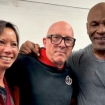Adam Jones is not necessarily the easiest guy to get an interview with. "We're very picky about who we talk to," the Tool guitarist tells Revolver. "Most of the time we only talk to people who have been very supportive and cool to us, because sometimes you'll talk to people who don't know much about the band, or they'll be like, 'Yeah, you guys are great,' but then the article will be about how they think what we're putting out is stupid. But Revolver has been awesome to us." Not to pat ourselves on the back or anything, but that's presumably why we made the cut when it came time for the band to discuss the forthcoming reissue of their 1992 debut EP, Opiate. Tool will commemorate the 21st anniversary of its release on March 26 with a limited-edition run of collectible CDs, complete with new packaging and stereoscopic artwork in the vein of their 2006 album, 10,000 Days. As such, we asked Jones to take us on a walk down memory lane.
REVOLVER What do you remember about the writing process for the songs on Opiate?
ADAM JONES That's a loaded question because we'd been playing live and we got multiple record offers. It got very strange because at that point we were doing this as a hobby. We all had day jobs. I was doing makeup effects and art. Maynard was doing set design. Dan [Carey, drums] and Paul [D'Amour, Tool's former bassist] both had day jobs as well. We still had this hunger to write songs that we liked, but it wasn't really about putting them out. So it was a very different mind frame back then. At the time we did Opiate, we had probably about half the songs from Undertow written. Someone at the label was like, "You guys gotta put out your heaviest stuff! That's how you're gonna get noticed!" It took us a long time to figure out how politics work at a record company. [Laughs] That's the money side of the fence, so there's a different perspective. But obviously one helps the other. So we said OK. We picked the heaviest songs and did this, like, teaser record. We thought it was a record, but the record company counted it as an EP. But that's a different story. [Laughs]
What about the recording process? Opiate marked the first time you worked with producer Sylvia Massey.
Well, there were a lot of people besides Sylvia. There was a lot of outside influence. But we were kinda like a well-oiled machine. We had those songs down, so it didn't take a long time to record them. I think we recorded it at Sound City, and it was our first time in a big professional studio like that. Then we rented a huge professional recording truck and parked in back of the Jello Loft to record those live tracks at the end the record. We thought maybe people hearing the energy of the band in a controlled environment and then the energy of the band in a live environment might be a good way of presenting ourselves.
What's your favorite song on Opiate?
It's a good question, but it's like asking what my favorite kind of ice cream is. I don't have a favorite because I like so many. So I don't know. I like 'em all. "Jerk-Off" is really fun to play for me as a guitar player, but I don't think I have a favorite.
What can you tell us about the hidden track, "The Gaping Lotus Experience"?
A lot of times when you're in the studio trying to record as a band, you're all in your own little rooms and you can't see each other. Maybe you're trying to capture the performance of the drums as a starting point, so you're playing the same track over and over again because someone fucks up or it's not feeling right. And then at some point, you just start jamming something else. Sometimes it'll be a really bad cover song. In those days, Maynard would jump in and be funny or just start doing lyrics off the top of his head. And the tape is rolling, you know? So we looked back on that particular bit and we decided to include it as a hidden track. It's a contrast in that we're very serious as a band but we're not very serious about ourselves. Which I think is a good thing to indicate.
What kind of expectations did the label have for Opiate at the time?
I don't know. There were a lot of people I liked at our record label at the time, but I really liked the president. It was kind of a small label, which is why we went with them, and we learned very quickly that if we wanted something done we had to go directly to him. He just liked the energy of the band and thought we had a lot of potential. I remember he told us, "I discovered U2!" [Laughs] I don't know if that's true, but he gave us the artistic freedom we were looking for. We could've signed for a lot more money, but we took less money so we could have more control artistically. We really wanted to make sure the music was pushed rather than, "Which one's cuter?" or "Which one jumps around onstage?" And they were very supportive of that. But then there was the marketing side, which is where we started butting heads with the people that worked there. [Laughs] I could go on and on about how so many people there just didn't get us. They were a very diverse label—they had rap, they had R&B, they had…never mind. I don't even wanna talk about it. They just wanted something to hit. But we went with them because they had Green Jellö. Bill Manspeaker from Green Jellö told us they were very happy there because they were very supportive of how weird those guys were. But it really worked out great for us once we figured out we just had to call the president. Whatever it was, he'd be like, "Yeah—let's do it! And let's throw a little more money at it…" And you never hear that. Nowadays, if you want money from a record label, you gotta chew glass and bleed all over yourself.
Overall, how does Opiate hold up for you 21 years after its release?
It's kinda like a time machine. It takes you back to that time and what you were thinking. Creatively speaking, there's always room for improvement. Playing some of those songs live 21 years later, you've obviously evolved. And now Justin [Chancellor, bass] is in the band, which makes it that much different and better. So it's fine. I mean, I'm sure you've written an article where you go back and look at it and wish you'd set it up differently. So you can always change stuff. But I'm very happy with it. It's really fun to give it a birthday and celebrate it. It's more of a special thank-you for the fans. I know that sounds weird because we're selling it, but we just wanted to make sure we did something unique and special with it—which is why rather than just reissue the music, we're going back and readdressing all the packaging and artwork. I felt like George Lucas going back and adding digital effects to Star Wars. I know a lot of people are against that, but I'm into it. It doesn't change the story. I think it's great. It's stuff that you wanted to do back then but you couldn't.
Is there anything specific you would change about it?
Maybe the way it's mixed. But there's a politic in that whole thing, too. You can't just explain it to somebody, as far as capturing your music the way you want. As far as my guitar playing? Yeah, maybe I'd redo a lead or use a different effect here and there, but overall I like it. It's something I'm very proud of.
Why did you decide to do the reissue for the 21st anniversary rather than the more traditional 20th? Is the idea that Opiate is legal now?
[Laughs] No, it's because we're dummies. We talked about it when the 20th anniversary was coming up, but it never got done. [Laughs] A year later, it was like, "Oh, fuck—we missed our window." But now it's 21, so yeah—it can drink!
Are there bonus tracks on this thing?
There are no bonus tracks. It's the original CD in new packaging. We're writing right now, so there's not really the time to readdress that stuff. That's why we're not making that many. If it was a bigger commercial thing, there might be an expanded version.
There're five different versions of the artwork, right?
I'd call them variations. That defines it a little better. There's hand-pressed printing, there's old machine printing. [Designer] Mackie Osborne is kind of celebrating the intimacy and originality of this thing. If we had the budget, we'd take everything as far as possible. I've always lived my life in terms of what I want out of something, and what I want is to go to the store and buy something and go, "Goddamn, I got more than my money's worth." I want something where you can tell a lot of time went into it. That's what I love about painting. I appreciate stuff that people do in one day, but I appreciate seeing the layers of paint and the brushstrokes more—seeing that this person really ripped their guts out trying to capture something. But to answer the question, there will be five variations in color, and a thousand copies of each. So five thousand copies total. And I know they're putting extra stuff in it, like some stickers, and I did a 3-D separation of some of the artwork so you can view it through the stereoscopic goggles from the 10,000 Days album. I think there's a golden ticket, too, that's supposed to be in one of every thousand. I'm not sure what you get if you get the golden ticket—maybe tickets to one of our shows or something—I don't think we've decided yet. We're still putting it together. It's actually being printed right now.
So what exactly is happening with the artwork?
When we did the original art for Opiate, I had a lot of people helping me and a lot of outside influence. I was doing makeup effects and sculpting in Hollywood. So for the art, we picked the song "Opiate" and tried to design artwork around it. For the reissue, it was really nice to readdress that, especially my priest, because I wanted to get something a little more mystical and three-dimensional going on. Obviously, sculpting is three-dimensional, but I'm talking about ideas and thinking. So I asked Adi Granov to come and work with us. He's this amazing comic book illustrator, and he's designed a lot of the Iron Man suits for the Iron Man movies. He hit me up on Facebook a while ago, and we became friends. So when it came time to do this Opiate packaging, I totally thought of him. I sent him some sketches and ideas, he sent some sketches back, and he just nailed it, man. So we turned it all over to Mackie—she's worked on a lot of our stuff, and she's [Melvins singer-guitarist] Buzz Osborne's wife—and she's found this thick paper to print everything on that's gonna make this thing really special and collectible. Of course, everyone of my fucking friends is asking me for a free copy—the same people I never hear from until we play live in L.A. Maynard's funny: Whenever we play L.A., he changes his outgoing message so whenever you call his phone it goes, "Buy a ticket."
You mentioned earlier that you guys are in writing mode. What's the status of new Tool music?
I guess you wouldn't be doing your job if you didn't ask. [Laughs] It's unfortunate that we haven't put anything out in a while, but you know, we've changed as a band. It's just like a marriage—you grow older, people change, and you've gotta adapt or move on. We've become even more eclectic and distant, so getting things done and getting together is very hard. There are a lot of other interests. But what I really want people to know is that it's not a bad thing. I'm serious. I think there's a little more respect now, and when there's compromise, it's a little more open. I don't know if that's just a matter of getting older and going, "Ah, fuck it," or what. [Laughs] I've been with these guys a long time, and we've outlasted all of our peers. I mean, I try to think of the bands we came up with that haven't broken up or broken up and gotten back together, and I can't think of one band. OK, the Melvins. But that's it. And we kind of set that up early by deciding that no matter who does what we're gonna split everything four ways. Some decisions have to be unanimous. Others are put to a vote. We're really involved in the business side. We write our own checks. But as far as the writing? It's been a little more lax—as in relaxed. But it's nice. We live kind of cushy lives now, so we get together when we want. It makes everything go slow, which is unfortunate—we all would have liked to have been done with a new record a long time ago—but when it's done, it's gonna be good. And that's the point. We're not gonna put out something that sucks just to put it out. We also had two really bad things happen, things that I'm not gonna get into, that set us back emotionally and mentally. But we're past them now, everybody's recovered, and that process has kind of actually added to us focusing on being creative. So maybe sometimes bad things happen for a reason.








